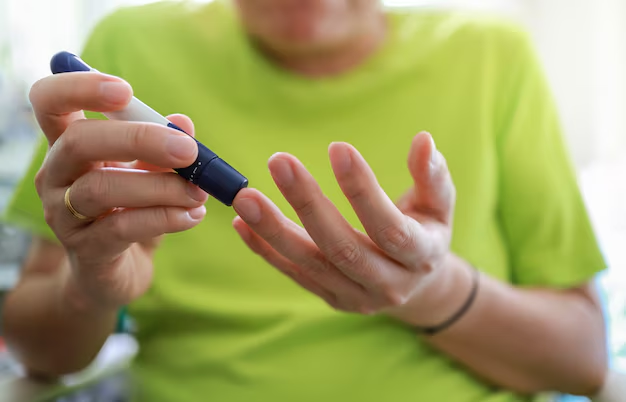Your Guide to Can You Die From Diabetic Ketoacidosis
What You Get:
Free Guide
Free, helpful information about Diabetes FAQ and related Can You Die From Diabetic Ketoacidosis topics.
Helpful Information
Get clear and easy-to-understand details about Can You Die From Diabetic Ketoacidosis topics and resources.
Personalized Offers
Answer a few optional questions to receive offers or information related to Diabetes FAQ. The survey is optional and not required to access your free guide.
Understanding the Risks: Can Diabetic Ketoacidosis Be Fatal?
For those living with diabetes, the term Diabetic Ketoacidosis (DKA) is one that often looms with a sense of severity. But what exactly is it, and perhaps more importantly, can it be fatal? The short answer is yes, it can be deadly if not treated promptly. Understanding the risks and the ways to prevent this complication is crucial for anyone managing diabetes.
What is Diabetic Ketoacidosis?
DKA is a serious medical condition commonly associated with Type 1 diabetes, although it can occur in those with Type 2 diabetes as well. It happens when the body starts breaking down fats at a rapid rate, leading to the buildup of acids called ketones in the bloodstream. This results from insufficient insulin levels, which prevent glucose from entering cells. Consequently, the body turns to fat as an alternative energy source, producing ketones as a byproduct.
The symptoms of DKA are often dramatic and can include:
- Severe dehydration
- High blood sugar levels
- Rapid heartbeat
- Abdominal pain
- Confusion or difficulty concentrating
- Fruity-scented breath
These symptoms can escalate quickly, which emphasizes the importance of seeking immediate medical attention to avoid complications or fatal outcomes.
Can You Die From Diabetic Ketoacidosis?
While advancements in medical care have significantly improved the prognosis for many diabetics, DKA remains a life-threatening condition if not addressed quickly. Prompt treatment is vital as untreated DKA can lead to severe dehydration, electrolyte imbalances, and potentially fatal outcomes like cerebral edema or heart complications.
Preventing Diabetic Ketoacidosis
Prevention is the best approach to managing the risks associated with DKA. Here are some vital steps:
Monitor blood sugar levels consistently: Regular checks help detect early warnings of high glucose or ketone levels.
Adhere to a prescribed insulin regimen: Skipping insulin doses can significantly increase the risk of DKA.
Stay hydrated and maintain a balanced diet: Proper hydration and nutrition can help stabilize blood sugar levels.
Education: Understanding symptoms and how to manage your condition is crucial. Diabetic education classes can be an excellent resource.
Moving Beyond Medical Concerns: Financial and Educational Support
Living with diabetes can not only take a physical toll but a financial one as well. Treatments, medications, and ongoing health monitoring can be costly. Fortunately, numerous financial assistance programs exist to alleviate these burdens.
Government Aid Programs
Governments often provide assistance programs that can help cover medication costs or provide subsidies for necessary medical equipment. Research local or national programs available in your area to understand your eligibility.
Financial Assistance Options
Health insurance marketplace plans can often provide significant savings on medical expenses.
Pharmaceutical company assistance programs may offer medications at reduced costs for eligible patients.
Nonprofit organizations sometimes provide grants or financial relief for people with chronic conditions, including diabetes.
Educational Opportunities
For those who need to understand more about managing diabetes or DKA, consider exploring:
- Educational grants or scholarships for health-related studies
- Workshops and seminars on diabetes management
- Online resources and virtual support groups that offer continuous learning
By navigating these financial and educational avenues, you can manage diabetes more effectively and focus on leading a healthier life.
Programs and Resources for Diabetic Management and Support
- 🏥 Medicare/Medicaid: Health coverage options for seniors and low-income individuals.
- 💊 Patient Assistance Programs: Pharma companies offering discounted or free medications.
- 📚 Diabetes Education Grants: Support for those pursuing learning about diabetes management.
- 🩺 Nonprofit Health Initiatives: Grants and resources from organizations like the American Diabetes Association.
- 📈 State Health Departments: Check local resources for state-specific support and educational programs.
Awareness and proactive management are the keystones to preventing DKA and taking control of your health journey. Explore the available resources to ensure you're not facing these challenges alone.
What You Get:
Free Diabetes FAQ Guide
Free, helpful information about Can You Die From Diabetic Ketoacidosis and related resources.

Helpful Information
Get clear, easy-to-understand details about Can You Die From Diabetic Ketoacidosis topics.

Optional Personalized Offers
Answer a few optional questions to see offers or information related to Diabetes FAQ. Participation is not required to get your free guide.


